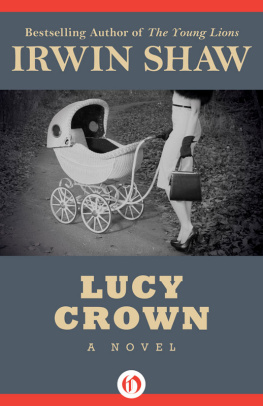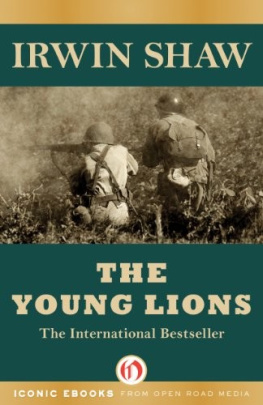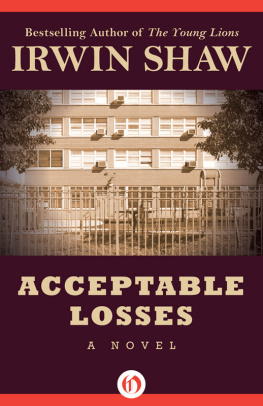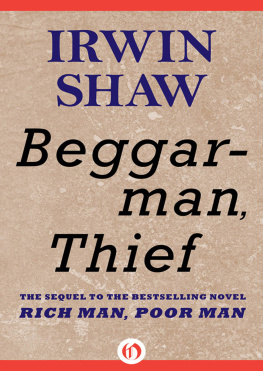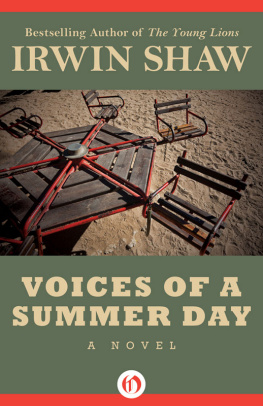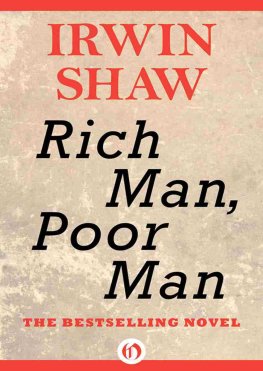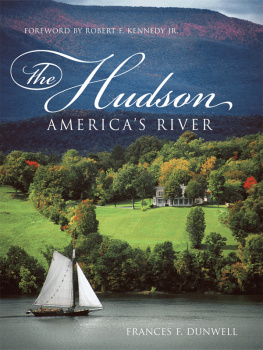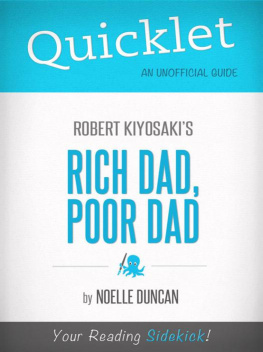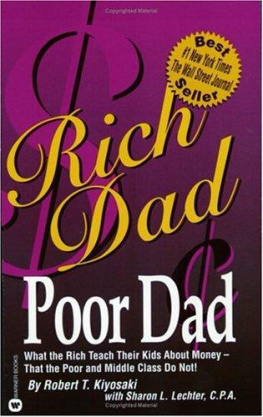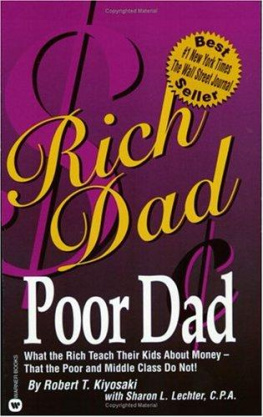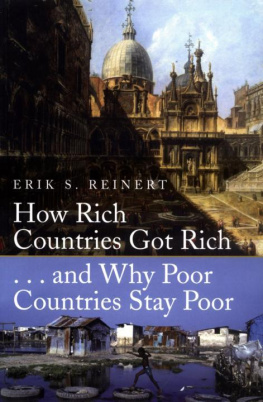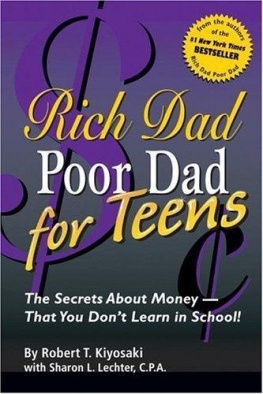Rich Man, Poor Man
Irwin Shaw
Mr Donnelly, the track coach, ended the days practice early because Henry Fullers father came down to the high school field to tell Henry that they had just got a telegram from Washington announcing that Henrys brother had been killed in action in Germany. Henry was the teams best shot-putter. Mr Donnelly gave Henry a chance to go in and change his clothes alone and go home with his father, then whistled to gather the whole of the squad in a group and said they could all go home, as a gesture of respect.
The baseball team was practising on the diamond, but nobody on the baseball team had lost a brother that afternoon, so they kept on practising.
Rudolph Jordache (two-twenty low hurdles) went into the locker-room and took a shower, although he hadnt run enough to work up a sweat. There never was enough hot water at home and when he could he showered at the gym. The high school had been built in 1927, when everybody had money, and the showers were roomy and with plenty of hot water. There was even a swimming pool. Usually, Rudolph took a swim too, after practice, but he didnt today, out of respect.
The boys in the locker-room spoke in low tones and there was none of the usual horsing around. Smiley, the captain of the team, got up on the bench and said he thought that if there was a funeral service for Henrys brother, they all ought to chip in and buy a wreath. Fifty cents a man would do it, he thought, You could tell by looking at the boys faces who could spare the fifty cents and who couldnt. Rudolph couldnt spare it, but he made a conscious effort to look as though he could. The boys who agreed most readily were the ones whose parents took them down to New York City before the school term to buy the years clothes for them. Rudolph bought his clothes in town, in Port Philip, at Bernsteins Department Store.
He was dressed neatly, though, with a collar and tie and a sweater under a leather windbreaker, and brown pants, from an old suit whose jacket had gone through at the elbows. Henry Fuller was one of the boys who got his clothes in New York, but Rudolph was sure Henry wasnt getting any pleasure from the fact this afternoon.
Rudolph got out of the locker-room quickly because he didnt want to walk home with any of the other fellows and talk about Henry Fullers brother. He wasnt particularly friendly with Henry, who was rather stupid, as the weight men were likely to be, and he preferred not to pretend to any excessive sympathy.
The school was in a residential part of town, to the north and east of the business centre, and was surrounded by semidetached one-family houses that had been built at about the same time as the school, when the town was expanding. They were all the same originally but through the years their owners had painted the trim and doors in different colours and here and there had made a bay window or a balcony in forlorn attempts at variety.
Carrying his books, Rudolph strode along the cracked sidewalks of the neighbourhood. It was a windy early spring day, although not very cold, and he had a sense of well-being and holiday because of the light workout and the short practice. Most of the trees had already put out their leaves and there were buds everywhere.
The school was built on a hill and he could see the Hudson river below him, still looking cold and wintry, and the spires
of the churches of the town, and in the distance to the south, the chimney of the Boylan Brick and Tile Works, where his
sister Gretchen worked, and the tracks of the New York Central, along the river. Port Philip was not a pretty town,
although once it had been, with big white Colonial houses mingled with solid Victorian stone. But the boom in the 1920s had brought a lot of new people into town, working people, whose homes were narrow and dark, spreading out into all neighbourhoods. Then the Depression had thrown almost everybody out of work and the jerry-built houses had been neglected, and as Rudolphs mother complained, the entire town had become a single slum. This wasnt absolutely true.
The northern part of the town still had many fine big houses and wide streets and the houses had been kept up through
everything. And even in the neighbourhoods that were run down there were big houses that families had refused to leave and were still presentable behind generous lawns and old trees.
The war had brought prosperity once again to Port Philip and the Brick and Tile Works and the cement plant were going full blast and even the tannery and the Byefield Shoe Factory had started up again with Army orders/But with the war on, people had other things to do than worry about keeping up appearances and; if possible, the city looked more dilapidated than ever.
With the town spread before him like that, planless and jumbled in the windy afternoon sun, Rudolph wondered if anybody would give his life to defend it or to take it, as Henry Fullers brother had given his life to take some nameless town in Germany.
Secretly, he hoped that the war would last another two years, although it didnt look as though it would. He was going to be seventeen years old soon and another year after that he could enlist. He saw himself with a lieutenants silver bars, taking an enlisted mans salute, waving a platoon to follow him under machine-gun fire. It was the sort of experience a man ought to have. He was sorry there was no more cavalry. That must have been something - waving a sabre, at a full gallop, charging the despicable foe.
He didnt dare mention anything like this around the house. His mother became hysterical when anybody as much as suggested that perhaps the war would last and her Rudolph would be taken. He knew that some boys lied about their age to enlist - there were stories about fifteen-year-old boys, even fourteen-year-olds, who were in the Marines and who had won medals - but he couldnt do anything like that to his mother.
As usual, he made a detour to pass the house where Miss Lenaut lived. Miss Lenaut was his French teacher. She was nowhere in sight.
Then he walked down to Broadway, the main street of the town, which ran parallel to the river and which was also the through highway from New York to Albany. He dreamed of having a car, like the ones he saw speeding through town. Once he had a car he would go down to New York every weekend. He wasnt quite sure what he would do in New York, but he could go there.
Broadway was a nondescript thoroughfare, with shops of all kinds mixed together, butcher shops and markets next to quite large stores that sold womens clothes and cheap jewellery and sporting goods. He stopped, as he often did, before the window of the Army and Navy Store, which had fishing equipment displayed along with work shoes and chino pants and shirts and flashlights and penknives. He stared at the fishing rods, thin and elegant, with their expensive reels. He fished in the river and, when the season was on, in the trout streams that were open to the public, but his equipment was primitive.
He went down another short street and turned to his left on Vanderhoff. Street, where he lived. Vanderhoff Street ran parallel to Broadway and seemed to be trying to emulate it, but doing it badly, like a poor man in a baggy suit and scuffed shoes pretending he had arrived in a Cadillac. The shops were small and the wares in their windows were dusty, as though the owners knew there really was no use. Quite a few of the shop fronts were still boarded up, having closed down in 1930 or 1931. When new sewer lines were laid down before the war the WPA had felled all the trees which had shaded the sidewalks and nobody had bothered to plant new ones. Vanderhoff was a long street and as he approached his own house the street became shabbier and shabbier, as though just the mere act of going south was somehow spiritually a decline.
Next page

